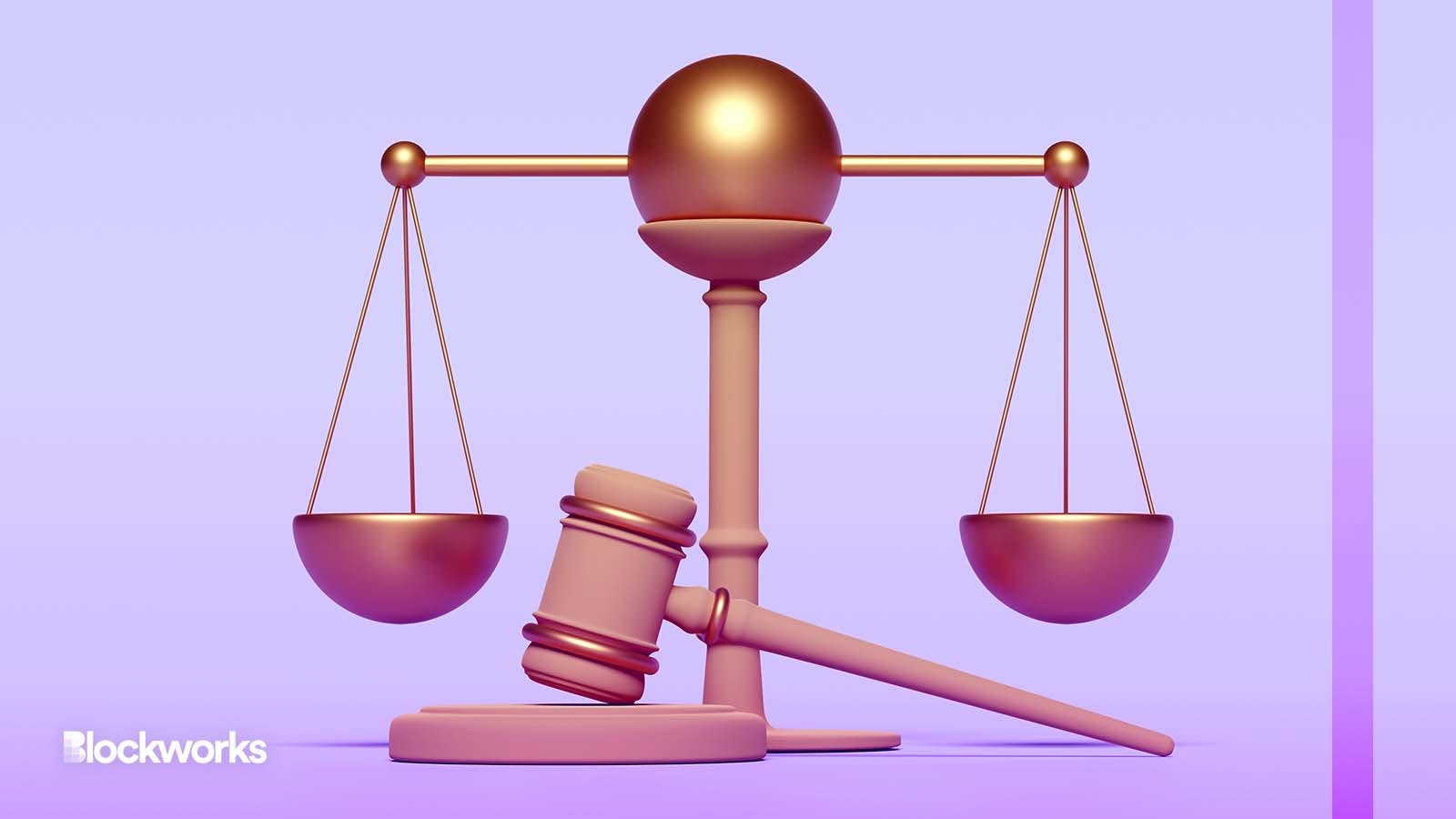Grayscale Appears To Win Opening Salvo in Bitcoin ETF Case vs SEC
Oral arguments in front of the DC Circuit Court of Appeals judges kicked off Tuesday after Grayscale sued the SEC last year

warat42/Shutterstock.com modified by Blockworks
DC Circuit Court of Appeals judges grilled the SEC on why the regulator approved bitcoin futures exchange-traded products (ETPs) and not Grayscale Investments’ proposed spot offering Tuesday — a line of questioning one analyst said could signal a ruling in favor of the crypto-focused asset manager.
The comments came in oral arguments in front of judges Sri Srinivasan, Neomi Rao and Harry Edwards Tuesday. The proceeding came after Grayscale and the SEC exchanged written briefs in recent months.
Grayscale sued the SEC last June after the agency did not allow the firm to convert its flagship Bitcoin Trust (GBTC) to an ETF.
GBTC launched in 2013 and holds $14 billion in assets. The trust has traded at a discount of more than 40% in recent weeks. Grayscale has said its preferred solution is converting the trust to an ETF.
Donald Verrilli Jr., a former US solicitor general who Grayscale hired last year as a legal strategist, kicked off the hearing. Verrilli reiterated that the SEC’s approval of ETFs investing in CME-traded bitcoin futures, but not for proposed ETPs that invest in bitcoin directly — such as what GBTC would convert to — is discriminatory.
Emily Parise, an attorney representing the SEC, contended that bitcoin futures ETPs are different from the proposed spot bitcoin products the agency has denied. Bitcoin spot markets are “fragmented and unregulated,” Parise said.
Underlying products for the approved bitcoin futures ETFs instead trade only on CME, which is CFTC-regulated, she added, where the “exchange has a surveillance sharing agreement that gives it access to information like market trading activity, customer identification — the tools to investigate fraud and manipulation if it were to occur.”
Judges grill the SEC
Rao, during the hearing Tuesday, interrupted Parise on that point, saying the SEC needs to explain how it views the relationship between bitcoin futures and the spot price of bitcoin.
“It seems to me…one is essentially a derivative of the other,” the judge said. “They move together 99.9% of the time, so where’s the gap in the commission’s view?”
Parise said the correlation between once-a-day futures prices and spot prices doesn’t signal the “causal relationship” between the two.
But Rao added the SEC has not offered an explanation why Grayscale is wrong as it relates to the relationship between the bitcoin spot and futures markets. The judge said the SEC’s ruling on a bitcoin futures ETF by fund group Teucrium recognizes the futures prices are influenced by the spot prices.
“In approving the futures ETPs, it seems to be that the commission has to have necessarily drawn the conclusion that this arrangement would prevent fraud and manipulation on the underlying spot market,” Rao said.
An SEC spokesperson declined to comment about the oral arguments.
“The court asked thoughtful, pointed questions about the inextricable link between bitcoin spot markets and bitcoin futures markets — the exact points that are the bedrock of the case to convert GBTC to an ETF,” a Grayscale spokesperson told Blockworks in an email.
Questions signal a potential ruling?
Bloomberg Intelligence ETF Analyst James Seyffart told Blockworks Monday he expected the judges’ questions Tuesday could signal how they might rule on the case.
“Rao is definitely team Grayscale,” he tweeted during the hearing. “Grayscale needs to get Judge Srinivasan or Judge Edwards on their side as well and they can win.”
“Srinivasan seems to be leaning Grayscale as well based on this line of questioning,” Seyffart added. “WOW. The SEC lawyer seems to keep saying the futures aren’t and I quote “manipulated in the *same way*” and I don’t even understand what she’s trying to say.”
Seyffart told Blockworks that he believes it’s possible for all three judges to side with Grayscale — a “sharp reversal” of what he thought before the oral arguments began. He quantified Grayscale’s chance to win as 70% likely, noting that a decision could come as early as the second quarter.
“It’s possible the ruling tells the SEC to go back to the drawing board, where the SEC can put us back on the spot Bitcoin ETF denial merry-go-round by issuing another denial with different language and/or reasoning,” Seyffart said in an email. “So this could still be far from over.”
GBTC was up about 8% on the day, as of about 1:00 pm ET.
Get the news in your inbox. Explore Blockworks newsletters:
- The Breakdown: Decoding crypto and the markets. Daily.
- Empire: Crypto news and analysis to start your day.
- Forward Guidance: The intersection of crypto, macro and policy.
- 0xResearch: Alpha directly in your inbox.
- Lightspeed: All things Solana.
- The Drop: Apps, games, memes and more.
- Supply Shock: Bitcoin, bitcoin, bitcoin.






